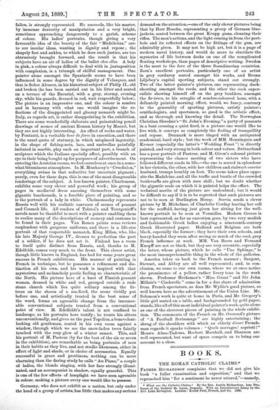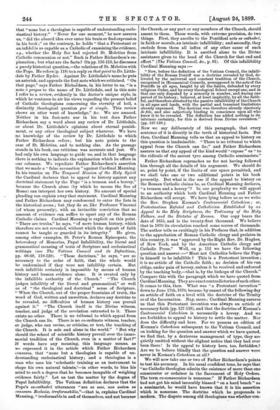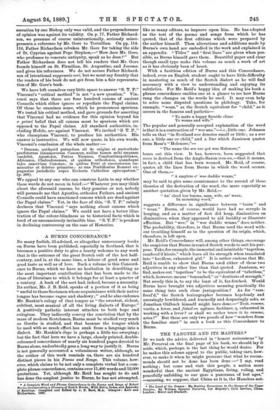BOOKS.
THE ROMAN CATHOLIC CLAMS
FATHER RICHA.RDSON complains that we did not give his book " a fuller examination and exposition," and that we reproached him "for a sentiment he never uttered,"—namely, • What are the Catholic Claims f By the Rev. Austin Richardson, late Pro- fessor of the Institut Bt. Louis, Brussels. With an Introductory Remy by the Rev. Luke Rivington. London: Regan Panl, Trench, and Co. 1880, that "none but a theologian is capable of understanding eccle- siastical history." " Never for one moment," he now assures us, " did the absurd idea ever enter his brain or find expression in his book ;" on the contrary, he holds " that a Protestant or an infidel is as capable as a Catholic of examining the evidence, e.g., whether the Holy See had rejected St. Meletius from Catholic communion or not." Such is Father Richardson's ex- planation ; but what are the facts ? On pp. 116-118, he discusses a purely historical question,--the relations of St. Meletius with the Pope. He refers (p. 118) to at reply on that point to Dr. Little- dale by Father Ryder. Against Dr. Littledale's name he puts an asterisk, and appends the foot-note which we criticised. " On that page," says Father Richal.dson, in his letter to us, "is a note apropos to the name of Dr. Littledale, and in this note I refer to a review, evidently in the doctor's unique style, in which he ventures to air his views regarding the present belief of Catholic theologians concerning the eternity of hell, a distinctly theological question pur et simple. This review shows an utter want of knowledge," &e. We are amazed. Neither in his foot-note nor in his text does Father Richardson say a word about any review of Dr. Littledale, or about Dr. Littledale's opinions about eternal punish- ment, or any other theological subject whatever. We have no knowledge of the review by Dr. Littledale to which- Father Richardson refers ; but his note points to the case of St. Meletius, and to nothing else. As the passage stands in his book, our criticism was accurate and just. We had only his own language to guide us, and in that language there is nothing to indicate the explanation which he offers in our columns. We repudiate Father Richardson's assertion that we made a " false accusation " against Cardinal Manning. In his treatise on The Temporal Mission of the Holy Spirit the Cardinal declares that to appeal to history against any doctrinal statement by the Pope " is a treason and a heresy," because the Church alone (by which he means the See of Rome) can interpret her own history. No amount of special pleading can explain away that statement. Cardinal Manning and Father Richardson may condescend to enter the lists in the historical arena ; but they do so, like Professor Tincenzi (of whom presently), with an invincible conviction that no amount of evidence can suffice to upset any of the Roman Catholic claims. Cardinal Manning is explicit on this point. " There are truths," he says, " of mere human history, which therefore are not revealed, without which the deposit of faith cannot be taught or guarded in its integrity." He gives, among other examples, St. Peter's Roman Episcopate, the heterodoxy of Honorius, Papal Infallibility, the literal and grammatical meaning of texts of Scripture and ecclesiastical writings (see The Vatican Council and its Definitions, pp. 68-69, 119-129). " These doctrines," he says, " are so necessary to the order of faith, that the whole would be undermined if they were not infallibly certain. But such infallible certainty is impossible by means of human history and human evidence alone. It is created only by the infallible authority of the Church." " The Church judges infallibly of the literal and grammatical," as well as of " the theological and doctrinal" sense of Scripture. -‘‘ When the Church, out of the proper fountains of truth, the word of God, written and unwritten, declares any doctrine to be revealed, no difficulties of human history can prevail against it." "The Church itself is the Divine witness, teacher, and judge of the revelation entrusted to it. There exists no other. There is no tribunal to which appeal from the Church can lie. There is no co-ordinate witness, teacher, or judge, who can revise, or criticise, or test, the teaching of the Church. It is sole and alone in the world." "But why should the school of scientific history prevail over the imme- morial tradition of the Church, even in a matter of fact P" If words have any meaning, this language means, as we expressed it in the article which Father Richardson censures, that "none but a theologian is capable of un- derstanding ecclesiastical history; and a theologian is a man who uses his scholastic training as an instrument to shape his own natural talents,'—in other words, to bias his mind to such a degree that he becomes incapable of weighing evidence fairly." Let ns test the matter by the dogma of Papal Infallibility. The Vatican definition declares that the Pope's ex-cathedrd utterances " are ex use, non natant ex consensu Ecclesiz, irreformabilia,"—that is, explains Cardinal Manning, " irreformable in and of themselves, and not because
the Church, or any part or any members of the Church, should assent to them. These words, with extreme precision, do two things. First, they ascribe to the Pontifical acts ex cathedrci, in faith or morals, an intrinsic infallibility; and secondly, they exclude from them all influx of any other cause of such intrinsic infallibility. It is ascribed alone to the Divine assistance given to the head of the Church for that end and effect" (The Vatican Council, &c., p. 91). Of this infallibility Cardinal Manning says :-
"Now, before the definition of the Vatican Council, the infalli- bility of the Roman Pontiff was a doctrine revealed by God, de- livered by the universal and constant tradition of the Church, recognised in (Ecumenical Councils, presupposed in the acts of the Pontiffs in all ages, taught by all the Saints, defended by every religious Order, and by every theological School except one, and in that one only disputed by a minority in number, and during one period of its history ; believed, at least implicitly, by all the faith- ful, and therefore attested by the passive infallibility of the Church in all ages and lands, with the partial and transient limitations already expressed. The doctrine was therefore already objectively de fide, and also subjectively binding in conscience upon all who knew it to be revealed. The definition has added nothing to its intrinsic certainty, for this is derived from Divine revelation." (pp. 127-128.)
Now we say deliberately of this paragraph, that every sentence of it is directly in the teeth of historical facts. But then, Cardinal Manning tells us that an appeal to history on this question is inadmissible. " There is no tribunal to which appeal from the Church can lie ;" and Father Richardson assures us that any appeal of the kind would " expose " us " to the ridicule of the merest tyro among Catholic seminarists."
Father Richardson reproaches us for not having followed him through all the details of his argument. We should do so, point by point, if the limits of our space permitted, and we shall take one or two additional points in his book presently. But what is the use if the appeal to history on the Roman Catholic claims be, as Cardinal Manning declares, "a treason and a heresy "? In our perplexity we will appeal to an authority which both Cardinal Manning and Father Richardson will accept. We have lying before us as we write the Rev. Stephen Keenan's Controversial Catechism ; or, Protestantism Refuted and Catholicism Established by an Appeal to the Holy Scriptures, the Testimony of the Holy Fathers, and the Dictates of Reason. Our copy bears the date of 1855, and is the twenty-first thousand. We believe that in 1870 its circulation reached some scores of thousands. The author tells us exultingly in his Prefaces that, in addition to the approbation of Roman Catholic clergy and prelates in this country, it was " approved by the Right Rev. Dr. Hughes, of New York, and by the American Catholic clergy and Catholic Press." Well, on p. 112 we have the following question and answer :—" Must not Catholics believe the Pope in himself to be infallible P This is a Protestant invention ; it is no article of the Catholic faith ; no decision of his can oblige, under pain of heresy, unless it be received and enforced by the teaching body,—that is, by the bishops of the Church."
Compare this with the paragraph which we have quoted from Cardinal Manning. They are exact contradictories of each other.
It comes to this, then. What was "a Protestant invention down to June 17th, 1870, became by sunset of the following day an article of faith on a level with the doctrine of the Trinity or of the Incarnation. Nay, more; Cardinal Manning assures us that this Protestant invention was always an article of
necessary faith (pp. 127-128), and that the doctrine of Keenan's Controversial Catechism is necessarily a heresy. And we are forbidden to appeal to history to settle the matter. Nor does the difficulty end here. For we possess an edition of Keenan's Catechism subsequent to. the Vatican Council, and on looking for the question and answer which we have quoted, we find that, by a dexterous management of type, they are quietly omitted without the slighest notice that they had ever been there ! Is the appeal to history here, too, forbidden P Are we to believe blindly that the question and answer were never in Keenan's Catechism at all?
We will now take one or two of Father Richardson's points to test his accuracy. In his usual confident tone, he says that "no Catholic theologian admits the existence of more than one consecrator or ordainer in the Sacrament of Holy Orders. The term co-consecrator is nonsense." If Father Richardson had not got his mind incurably biassed " on a hard bench" as a seminarist, he would have known that it is his assertion which is nonsense. The doctrine which he propounds is modern. The dispute among old theologians was whether con- seeration by one Bishop only was valid, and the preponderance of opinion was against its validity. On p. 77, Father Richard- son, we presume of coarse unintentionally, seriously misre- presents a reference by Mr. Gore to Tertullian. On pp. 114- 116, Father Richardson rebukes Mr. Gore for taking the side of St. Cyprian against Pope Stephen,—" How dare Mr. Gore, who professes to venerate antiquity, speak as he does ? " But Father Richardson does not tell his readers that Mr. Gore founds himself on St. Firmilian, St. Augustine, and Jerome, and gives his references. We do not accuse Father Richard- son of intentional suppressio yeti, but we must say frankly that the readers of his book do not get from him a fair representa- tion of Mr. Gore's book.
We have left ourselves very little space to answer "S. T. P."
Vincenzi's "critical method" is not "a new question." Yin- eenzi says that there are four hundred canons of ancient Councils which either ignore or repudiate the Papal claims. Of these he examines some, which he pronounces spurious.
We tested his critical method, and gave grounds for asserting that Vincenzi had no evidence for this opinion beyond his a priori belief that all canons must be spurious which are opposed to the Papal claims. All standard authorities, in- cluding Hefele, are against Vincenzi. We invited " S. T. P.," who champions Vincenzi, to produce his authorities. His .answer is instructive. We will now quote, in his own words, Vincenzi's conclusion of the whole matter :—
" Demum, qnidquid pntandum sit de origin et auctoritate przefatortun innnmerorum Canonun, nullus tamen mini unquam suadebit, Apostolos, Patres Nimenos, Constantinopolitanos, Africanos, Chalcedonenses, et quidem orthodoxos, quandoque tales sancivisse Canones ; in quibus Petri et successorum im- minuitur et deletur primates ; ac nna Pontificatus Romani ex- pugnatur jurisdictio supra Eccleshe Catholicu episcopatum." .(p. 298).
We appeal to any one who can construe Latin to say whether these words do not mean in brief :—" Whatever you may think about the, aforesaid canons, be they genuine or not, nobody
will persuade me that Apostles, orthodox Fathers, and ancient Councils could have sanctioned canons which are dead against the Papal claims." Yet, in the face of this, "S. T. P." calmly declares that Vincenzi " says nothing about canons which
ignore the Papal claims." We could not have a better illus- tration of the colour-blindness as to historical facts which is bred of an unconsciously invincible bias. " S. T. P." is prudent in declining controversy on the case of Honorius.




































 Previous page
Previous page